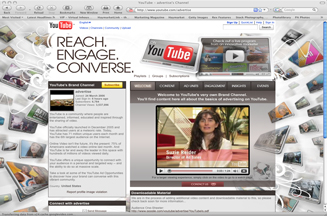
YouTube is stuck between a rock and a hard place. The video-sharing site's owner, Google, wants to make revenue from it, but the most obvious way to achieve this - charging brands to advertise around video clips - could put off users.
Anna Bateson, YouTube's incoming European marketing director, who is currently director of viewer marketing at ITV, is set to take up her new role in May, with a remit to develop the brand in the UK and across Europe.
While commercialisation of the site has been high on the agenda for Google, Bateson's experience is different from that of her commercial predecessor, Jonathan Gillespie, who left to join GMG Radio.
Gillespie, who was briefed to drive online video and display revenue at YouTube, came from a media agency background. Bateson, meanwhile, has been instrumental in ITV's channel marketing plans, promoting programmes and unveiling ITV2's overhaul aimed at attracting more 16- to 34-year-old viewers.
Bateson is unwilling to detail her vision for YouTube before joining, except to confirm that the role is 'at least in equal part about the brand'. She explains: 'As YouTube increasingly matures into a commercial entity, the brand becomes ever-more significant.'
Kristof Fahy, vice-president of marketing Europe at rival Yahoo!, says Bateson faces two major challenges: managing the customer experience as the service grows, and making the site more commercial. 'They need to carefully balance the two,' he says. 'YouTube is the place to go for video, so you could ask why it needs marketing, but I can't imagine Google will bankroll its losses for long.'
Google has spent recent months wooing agencies with ad opportunities on the site, such as formats that fill the screen, as well as 'autoroll' and masthead spots.
'There are relatively few ads on YouTube, but as it looks at more interruptive stuff, it could cause [defections] to the other video-sharing sites,' says Fahy. 'I can see the need for [Bateson's] marketing role.'
Digital agencies agree that as more companies seek to advertise on YouTube, the site must maintain its own brand credentials with consumers, who may easily be put off by such commercialisation. Bateson's role is viewed as a more conventional marketing investment to help take YouTube's word-of-mouth success to new users without losing its current fan base. Bateson is also expected to nurture relationships with media owners and individual brands directly, rather than via agencies.
'YouTube can build on its credentials as an entertainment brand with high-calibre programming and brand content and extend its commercial range,' says Dan Clays, managing director of BLM Quantum. He expects YouTube to work more closely with media owners to incorporate long-form video content alongside the user-generated clips on the site. YouTube recently struck a deal with Metro-Goldwyn-Mayer to launch online channels carrying full-length films, TV shows and clips. Meanwhile, the BBC, Orange and Thomas Cook have all developed branded YouTube channels that inform consumers about their latest initiatives.
Time to share
Despite the popularity of YouTube, more people are sharing and viewing user-generated videos elsewhere. YouTube has been quick to catch on to this, and this month started trialling downloadable videos that users can then share on other websites.
In a blog post about this development, YouTube said 'many video creators want their work to be seen far and wide'. It also revealed that it is testing a service that will enable video owners to charge other YouTube users for downloading their content.
Sharon Braude, group account director at interactive agency Media Contacts, says YouTube is wise to maintain a strong relationship with its video owners, and warns that promoting commercial content could be dangerous. 'If YouTube moves into the aggregator broadcaster role, it could lose its USP,' she adds.
Fahy agrees that YouTube works best as a 'video search engine', but advises Bateson against changing its model to become a fully fledged entertainment channel. 'It has to be careful from a brand point of view,' he says. 'If you visit YouTube to search for mad car races and find only Top Gear clips, then the brand has been diluted.' He concludes that commercialisation may lead YouTube to lose its 'essence'.
YouTube in the UK
- 23.7m viewers on YouTube.com
- 50% share of videos viewed online
- 17% year-on-year increase in number of videos viewed

